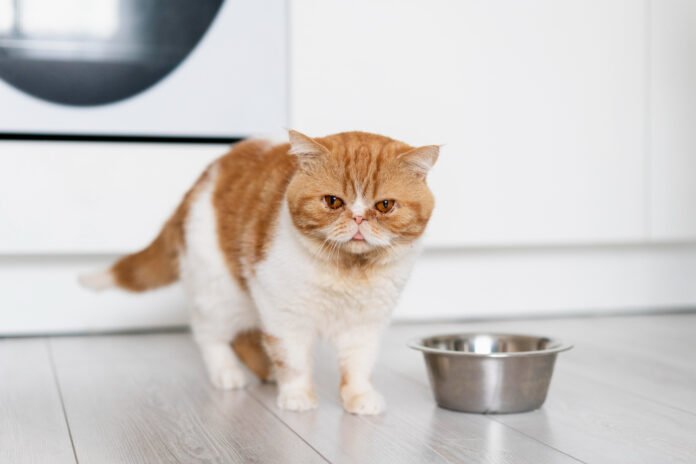How long can a cat go without food? When it comes to our feline friends, understanding their dietary needs and the effects of food deprivation is crucial for ensuring their health and well-being. As a pet owner, you might wonder, “How long can a cat go without food?” This article delves into the factors influencing a cat’s ability to survive without food, the potential health risks, and what you should do if you find yourself in a situation where your cat isn’t eating.
Understanding Feline Nutrition
The Importance of a Balanced Diet for Cats
Cats are obligate carnivores, meaning their diet must primarily consist of meat. Unlike omnivores, cats lack the ability to convert carbohydrates into energy effectively, so they rely on proteins and fats from animal sources. A balanced diet ensures that cats receive essential nutrients, including vitamins, minerals, and amino acids crucial for their overall health.
How Cats Process Food
A cat’s digestive system is adapted to a high-protein diet. Their stomach and intestines efficiently process and absorb nutrients from meat. However, their metabolism differs significantly from humans and other animals, making them more susceptible to health issues if they miss meals.
How Long Can a Cat Go Without Food?
General Guidelines
How long can a cat go without food: In general, a healthy adult cat can survive without food for approximately one to two weeks. However, this timeframe can vary based on several factors, including the cat’s age, health status, and body condition. It’s important to note that while a cat might survive without food for this period, it does not mean they will be healthy or without suffering.
Factors Affecting Survival
Age: Kittens and senior cats are more vulnerable to the effects of food deprivation. Kittens require constant nourishment for growth and development, while older cats may have compromised health, making them less resilient.
Health Status: Cats with pre-existing health conditions, such as diabetes or liver disease, are at greater risk of complications if they don’t eat. Their bodies may not handle food deprivation well, leading to rapid deterioration in their health.
Body Condition: A cat’s overall body condition plays a crucial role. A cat with more body fat might endure food deprivation slightly longer than a leaner cat, but this doesn’t make it safe or advisable.
The Consequences of Food Deprivation
Short-Term Effects
In the short term, a lack of food can lead to lethargy, irritability, and a decrease in activity levels. Cats may also exhibit a lack of interest in play and reduced grooming behavior. They might also become more vocal or aggressive in response to hunger.
Long-Term Effects
Extended periods without food can lead to severe health issues, including:
Hepatic Lipidosis (Fatty Liver Disease): This condition is one of the most serious complications of prolonged food deprivation in cats. When a cat doesn’t eat, its body starts breaking down fat for energy, which can overwhelm the liver, leading to liver failure.
Malnutrition: Prolonged food deprivation can cause malnutrition, leading to weight loss, muscle wasting, and a weakened immune system. Malnourished cats are more susceptible to infections and other diseases.
Dehydration: Although cats can survive longer without food than water, they still need adequate hydration. Lack of food can also lead to reduced water intake, exacerbating dehydration.
Signs Your Cat Is Not Eating
Behavioral Changes
How long can a cat go without food: Cats may display various signs if they’re not eating, including:
Loss of Appetite: A sudden or prolonged refusal to eat.
Change in Behavior: Increased hiding, aggression, or lethargy.
Weight Loss: Noticeable decrease in body weight or visible ribs.
Physical Symptoms
Vomiting: Regular or unexplained vomiting can be a sign of an underlying issue affecting their appetite.
Diarrhea: Changes in stool consistency or frequency can indicate digestive problems.
Dry, Flaky Skin: Poor skin condition may be a result of malnutrition.
What to Do if Your Cat Isn’t Eating
Immediate Actions
Consult a Veterinarian: If your cat refuses to eat for more than 24 hours, it’s essential to consult a vet. They can diagnose any underlying health issues and provide appropriate treatment.
Check for Medical Issues: A vet will perform a thorough examination to identify any medical conditions that might be causing your cat’s lack of appetite.
Ensure Hydration: Make sure your cat has access to fresh water. Dehydration can quickly become a critical issue.
Potential Treatments
Medical Interventions: Depending on the diagnosis, treatment may include medications, special diets, or fluids administered either orally or through injections.
Nutritional Supplements: In some cases, your vet may recommend high-calorie supplements to help your cat regain strength and appetite.
Preventing Food Deprivation
Maintain a Consistent Feeding Routine
Regular Feeding Schedule: How long can a cat go without food: Establish a consistent feeding routine to help your cat maintain a healthy diet.
Monitor Food Intake: Keep an eye on your cat’s food consumption and weight to spot any changes early.
Addressing Health Issues
Regular Check-ups: Schedule regular veterinary check-ups to catch and address health issues before they affect your cat’s appetite.
Prompt Treatment: Address any health concerns promptly to prevent them from leading to food deprivation.
Conclusion
How long can a cat go without food? Understanding how long a cat can go without food and the potential consequences of food deprivation is essential for every cat owner. While a healthy cat might survive for a week or two without food, the impact on their health can be severe and long-lasting. Regular feeding, monitoring your cat’s health, and consulting with a veterinarian are crucial steps in ensuring your feline friend remains healthy and happy. Always prioritize your cat’s well-being and seek professional help if you notice any signs of food deprivation or health issues.
Frequently Asked Questions
Q:1 How long can a kitten go without food?
A:1 Kittens should not go without food for more than a few hours. They require regular feeding to support their rapid growth and development. If a kitten isn’t eating, seek veterinary advice immediately.
Q:2 Can a cat survive without food if it has access to water?
A:2 While a cat can survive longer without food if it has access to water, it’s not a safe or healthy situation. Dehydration and malnutrition can still occur, and both can lead to severe health issues.
Q:3 What are the early signs of hepatic lipidosis in cats?
A:3 Early signs of hepatic lipidosis may include sudden weight loss, decreased appetite, vomiting, and lethargy. If you notice these symptoms, consult a veterinarian as soon as possible.
Q:4 How can I encourage my cat to eat if it’s not interested in food?
A:4 Try offering different types of food, such as wet food or high-quality treats. Warm the food slightly to enhance its aroma. If your cat continues to refuse food, consult a vet for advice.
Q:5 When should I be concerned about my cat’s appetite?
A:5 If your cat hasn’t eaten for more than 24 hours or shows other signs of illness, such as vomiting, diarrhea, or lethargy, it’s time to seek veterinary attention.
See More


